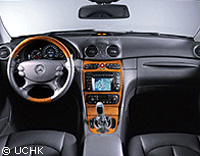Commissioner Reding launches Intelligent Car flagship project
Information Society and Media Commissioner Viviane Reding launched the Intelligent Car initiative on 14 September at the International Motor Show (IAA), in Frankfurt, Germany. Intelligent Car is one of three flagship projects under Ms Reding's i2010 initiative designed to use information and communication technologies (ICTs) to enhance economic growth and employment in Europe, as well as improve public services and quality of life. Modern society depends heavily on mobility. Yet most transport problems, such as congestion of trunk routes and in urban areas, harmful effects on the environment and public health, waste of energy and above all, accidents which cause fatalities, injuries and material damage, have yet to be overcome. The Intelligent Car flagship will be a powerful tool for reaping the benefits of ICT in the transport sector. The key aim of the flagship initiative is to accelerate the take-up and use of advanced ICT-based in-vehicle systems that make road transport safer and cleaner, by raising user awareness of such systems and their benefits, and by facilitating their deployment. Activities under this initiative will include raising awareness of research and development results, sharing and publicising best practice and facilitating the deployment of mature technologies and systems in the initial phase of market penetration. The key players involved in this flagship initiative are citizens, whom the Commission says cannot be expected to invest in technology unless its benefits are clear; the EU automotive industry, which makes about 17 million vehicles per year, employs close to 2 million people and has a worldwide turnover of more than 450 billion euro; and ICT suppliers. Finally, the EU Member States should play a vital role in providing political support for technology take-up, according to Ms Reding. Examples of systems that use advanced ICT to provide solutions to today's transport problems include Autonomous Cruise Control (ACC), which helps to avoid rear-end collisions and which experts say could save up to 4,000 lives per annum if 10 per cent of vehicles were equipped with it by 2010. Furthermore, Lateral Support (lane departure warning and lane change assistant) could save 1,500 lives per annum if only 0.6 percent of vehicles were equipped with it by 2010, or 14,000 lives per annum if 7 percent of vehicles were equipped with it by 2020. The AWAKE project, meanwhile, which developed a driver hypovigilance system that wakes up drowsy drivers, estimates that technology like this could prevent up to 30 percent of fatal crashes on motorways and 9 percent of all fatal crashes. Also on 14 September, the Commission adopted a communication on phase two of the eSafety initiative 'eCall for all'. In the event of a crash, eCall (automatic emergency call technology) will call the emergency services - which can be reached throughout Europe under the single European emergency number 112 - and report your exact location. An eCall may be triggered automatically, or manually, by someone in the vehicle. If all vehicles in the EU were equipped with eCall technology by 2010, road accident fatalities could be reduced by 5-10 percent. Moreover, Ms Reding said that eCall could lead to annual savings of 26 billion euro due to lower hospital and medical costs and the quicker clearing of congestion caused by accidents. The Commission and automotive industry agreed on an action plan in February this year aimed at introducing eCall in all new vehicles starting by 2009. However, while many stakeholders have signed up to the road map for implementation, so far only two Member States (Sweden and Finland) are on board. Therefore, the Commission published its communication for 'Bringing eCall to citizens' which proposes four concrete measures by which Member States can put eCall into practice. Commissioner Redding declared in Frankfurt: 'I am generally pleased with the progress of eCall, in particular on the industry side. However, if EU Member States don't react, and fail to invest in the necessary emergency service infrastructure, we shall face a delay in the introduction of eCall technology.' The communication urges national and regional governments to act and to invest in the necessary emergency infrastructure for eCall, with a view to a pan-European launch in 2009, and to promote eCall at national and international fora. The communication also provides a road map for the full-scale roll-out of eCall.



